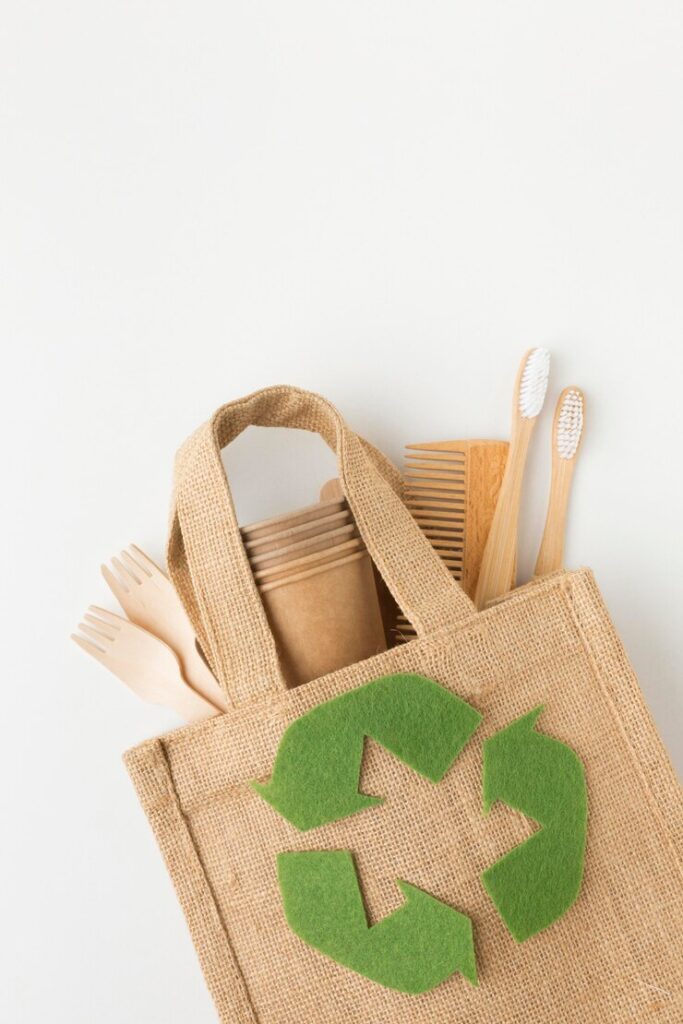
DIY projects to help you go zero waste
Embarking on a zero waste journey doesn’t mean you have to buy a lot of new products. In fact, many of the items you need can be made right at home. DIY zero waste projects not only reduce waste but also save money and offer a creative, personalized touch to your sustainable lifestyle. Here are some beginner-friendly projects to help you go zero waste.
1. Reusable beeswax wraps
Beeswax wraps are a fantastic alternative to plastic wrap for covering food. They’re reusable, easy to clean, and keep your food fresh. To make your own, all you need are a few pieces of cotton fabric, beeswax pellets, and an iron or oven.
- Steps: Cut the fabric into the desired size, place it on a baking sheet lined with parchment paper, sprinkle beeswax pellets over it, and heat in the oven until the wax melts. Use a brush to spread the wax evenly. Once it cools, your wrap is ready to use!
2. Cloth produce bags
Ditch the plastic produce bags and make your own reusable cloth bags for fruits and veggies. Old cotton pillowcases, t-shirts, or linen cloth work well for this project. Simply cut the fabric into your desired size, sew around the edges, and add a drawstring at the top.
These bags are durable, washable, and perfect for trips to the farmer’s market or grocery store. Plus, by repurposing old fabric, you’re reducing waste right from the start.
3. Homemade cleaning products
Many store-bought cleaners come in plastic bottles and contain harsh chemicals. Making your own cleaning products is a great way to avoid both. Basic ingredients like vinegar, baking soda, and essential oils can create effective, natural cleaners for different surfaces around your home.
- All-purpose cleaner: Mix equal parts white vinegar and water in a spray bottle, then add a few drops of essential oil (like lemon or tea tree) for a fresh scent. This cleaner works well on countertops, mirrors, and more.
- Scouring powder: Combine baking soda and a few drops of essential oil. Use this mixture with a damp sponge to scrub sinks, tubs, and tiles.
4. DIY cotton rounds
Reusable cotton rounds are an eco-friendly alternative to disposable makeup remover pads. They’re easy to make and can be washed after each use. Simply cut soft fabric like flannel or cotton into circles, sew two pieces together for extra thickness, and you’re done!
Store these rounds in a small container in your bathroom, and wash them in a mesh bag with your laundry. These rounds are gentle on the skin and eliminate the need for disposable makeup wipes.
5. Mason jar soap dispenser
Repurpose a mason jar into a stylish soap dispenser to reduce the need for plastic soap bottles. All you need is a mason jar, a soap pump (which you can save from an old soap bottle), and a drill or strong glue.
- Steps: Drill a hole in the mason jar lid to fit the pump or glue it securely. Fill the jar with liquid soap, screw on the lid, and your DIY soap dispenser is ready to use. This project works well for hand soap, dish soap, or even homemade lotion.
6. Compost bin
A compost bin is a great way to reduce food waste by turning it into nutrient-rich soil. You can make a simple compost bin using a large plastic or metal container with a lid.
- Steps: Drill small holes in the container for ventilation. Add a mix of “greens” (like vegetable scraps and coffee grounds) and “browns” (like dried leaves or shredded paper), and turn it every few days to speed up decomposition. After a few months, you’ll have compost ready for your garden or potted plants.
7. Upcycled glass jars for storage
Glass jars from pasta sauce, pickles, or jams make excellent storage containers. Clean and remove labels from the jars, and you’ll have free, eco-friendly storage for dry goods, spices, or leftovers.
Customize the jars by painting the lids or adding labels for easy organization. Not only do these jars look great in your kitchen, but they also cut down on the need for plastic containers and food storage bags.
8. DIY candles
If you enjoy candles, making your own is a sustainable way to reduce waste. You can reuse old candle jars or other small glass containers. All you need is natural wax (like soy or beeswax), a wick, and essential oils for fragrance.
- Steps: Melt the wax in a double boiler, place the wick in your container, and pour in the melted wax. Add a few drops of essential oil, let it cool, and trim the wick. Your homemade candles are ready to bring a cozy, zero waste touch to your home.
9. Fabric napkins
Replace paper napkins with reusable fabric ones. You can sew fabric napkins from old clothes, pillowcases, or fabric scraps. They’re easy to make and a simple way to reduce waste in your kitchen.
Just cut the fabric into squares, hem the edges, and you’ll have a set of reusable napkins. Keep them at the table or in the kitchen, and toss them in with your laundry when they need a wash.
10. Upcycled tote bags
Plastic bags are a significant source of waste, but reusable tote bags can replace them easily. You can make your own tote bags from old t-shirts or pillowcases. T-shirt bags are especially easy; simply cut off the sleeves, sew or tie the bottom shut, and you have a sturdy, washable bag for groceries or daily use.
These DIY projects make it easy to reduce waste while adding a personal, handmade touch to your home. By repurposing materials you already have, you save money and resources, and you may even find new hobbies in the process. Each small project is a step toward a more sustainable, zero waste lifestyle, empowering you to make a positive impact on the environment.
